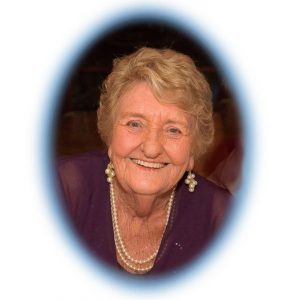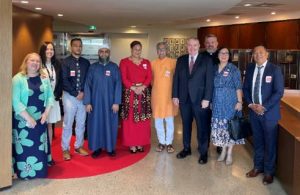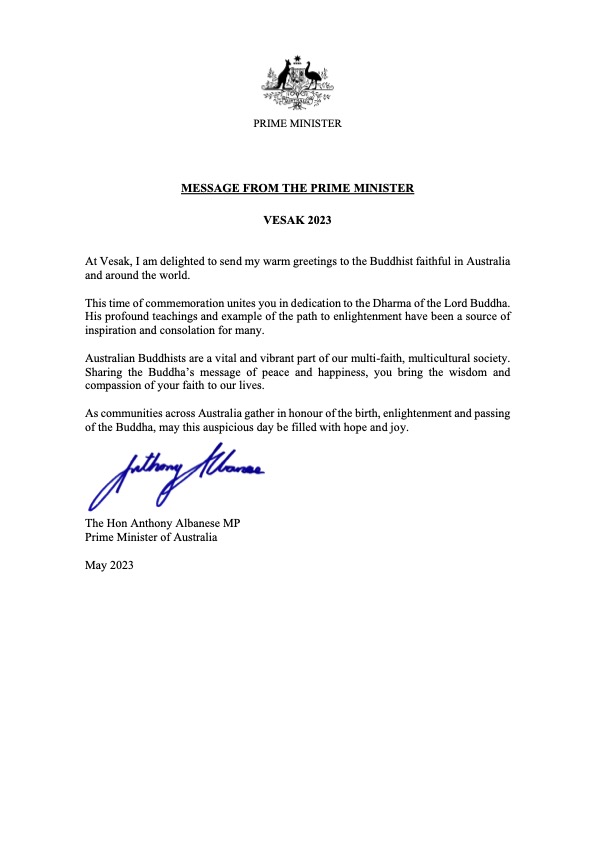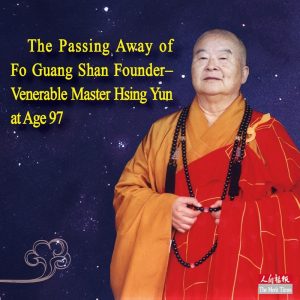Constitutional Recognition of First Nations Peoples
 The Federation of Australian Buddhist Buddhist Councils supports the recognition of First Nations peoples in the Constitution as requested in the Uluru Statement.
The Federation of Australian Buddhist Buddhist Councils supports the recognition of First Nations peoples in the Constitution as requested in the Uluru Statement.
Reconciliation and redressing past wrongs require a comprehensive response: symbolic recognition in the Constitution, effective structures for consultation and decision making through the Voice, as well as practical moves towards addressing the problems outlined in the Closing the Gap and other reports.
There are uncertainties about the effect of constitutional change and how effective the Voice will be in addressing Indigenous disadvantage. However we are reassured about the approach being taken because: Read more »
The Passing of Marlene Robbins – March 2023

Home Affairs Deputy Secretary (DS) of Social Cohesion and Citizenship, Andrew Kefford PSM visited Perth

Last week, the Home Affairs Deputy Secretary (DS) of Social Cohesion and Citizenship, Andrew Kefford PSM visited Perth.
In this role, he is responsible for Australia’s Citizenship Program, and social cohesion and Australian values, and is concurrently appointed as the Commonwealth’s Counter-Terrorism Coordinator and Counter Foreign Interference Coordinator. Andrew Kefford PSM is also the Indigenous Champion for the department of Home Affairs.
While in Perth, he met with various faith leaders across WA (pictured below). Discussions centred on how to maximise social cohesion outcomes across community, and acknowledging the critical role that faith leaders play in leading and building resilience.
DS Andrew Kefford PSM also hosted an afternoon tea with various community representatives from across Western Australia. It was an opportunity to thank and acknowledge the important role community representatives undertake in advocating for positive social cohesion outcomes for their community and for their continued engagement with the Australian Government.
(The BCWA president is pictured second from the right)
BLIAWA-Buddha Birthday 11&12 Feb 2023 at Supreme Court Garden in Perth
 Buddha’s Light International Association of Western Australia Inc. (BLIAWA) was officially registered as a not-for-profit Buddhist organisation in Western Australia and a BLIA Chapter in January 1993. In 2003, BLIA accepted the honour in joining the UN Economic and Social Council (ECOSOC) with special consultative status in recognition of BLIA’s work in promoting health, education and sustainability worldwide. As we enter 2023, we are proud to celebrate BLIAWA 30th Anniversary during the Buddha’s Birthday & Multicultural Festival
Buddha’s Light International Association of Western Australia Inc. (BLIAWA) was officially registered as a not-for-profit Buddhist organisation in Western Australia and a BLIA Chapter in January 1993. In 2003, BLIA accepted the honour in joining the UN Economic and Social Council (ECOSOC) with special consultative status in recognition of BLIA’s work in promoting health, education and sustainability worldwide. As we enter 2023, we are proud to celebrate BLIAWA 30th Anniversary during the Buddha’s Birthday & Multicultural Festival
This event has been supported by the Office of Multicultural Interests and City of Perth. BLIAWA welcomes you to witness the most auspicious day in the Buddhist calendar and to commemorate the founder of Buddhism, Sakyamuni Buddha’s day of birth. The theme for the festival is “Wisdom & Innovation, Environmental & Spiritual Preservation”. We have specially invited multi-faith leaders to offer a prayer for hope, unity in spirit and action, bringing about good health and world peace. Hence, your presence will be a significant contribution for sending this important message to all in the community.
Event will take place on the weekend (10:30am-8:30pm) 11 and (9am-5pm) 12 March 2023
Opening Ceremony: 6:00pm, 11 March 2023.
Venue: Supreme Court Gardens, Perth

